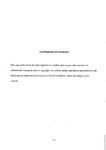The relationship between teachers' understanding of the nature of science and their science practice : four case studies from an urban primary school.
| dc.contributor.author | Waters-Adams, Stephen Laurence | |
| dc.contributor.other | Plymouth Institute of Education | en_US |
| dc.date.accessioned | 2011-09-27T16:17:29Z | |
| dc.date.available | 2011-09-27T16:17:29Z | |
| dc.date.issued | 2000 | |
| dc.identifier | Not available | en_US |
| dc.identifier.uri | http://hdl.handle.net/10026.1/750 | |
| dc.description | This is a digitised version of a thesis that was deposited in the University Library. If you are the author and you have a query about this item please contact PEARL Admin (pearladmin@plymouth.ac.uk) | |
| dc.description | Merged with duplicate record (10026.1/432) on 03.01.2017 by CS (TIS) | |
| dc.description.abstract |
This thesis explores the relationship between a teacher's understanding of the nature of science and her practice. The idea that teachers' understanding of the nature of science is a powerful determinant of their actions in the classroom has a strong intuitive appeal. Research over the last forty years has provided inconclusive results; however, there is a clear implication within recent central policy on teacher education that such knowledge should translated directly into practice. This has led to the identification within teacher training, materials of specific expectations regarding understanding of the nature of science (DfEE 1998a). This thesis presents four case studies of the science teaching of primary teachers. The studies derive from data collected over the course of a year and analyse evidence of the teachers' ideas, both tacit and espoused, about the nature of science against their practice in the classroom. The research employed a methodology unlike other studies in the field. Primary teachers frequently lack experience of reflection on the philosophy of science, and their actions may convey tacit ideas different from those they espouse. In order to ensure that, a mechanism existed to facilitate elicitation of the teachers' philosophical understanding, to render possible the identification of any tacit ideas and to enable the inherent dialectical nature of theory and action within practice to be accommodated, the participating teachers were encouraged to engage in action research on their own practice. Data generated by this personal inquiry then served as evidence for the main research questions. This methodology yields results which are closely derived from the everyday reality of teachers' practice. The findings indicate that teachers' understanding of the nature of science does not translate directly into predictable approaches to science teaching. Teachers' understanding of the nature of science is seen to be mediated strongly by their pedagogical beliefs and aims and it is these beliefs that assume overriding importance in the derivation of science practice. These findings extend previous research results. They suggest that the development of science practice will need to have regard for factors other than mere extension of knowledge, raising implications for both preservice and inservice teacher education. | en_US |
| dc.description.sponsorship | Rolle School of Education Research | |
| dc.language.iso | en | en_US |
| dc.publisher | University of Plymouth | en_US |
| dc.subject | Education & training | |
| dc.title | The relationship between teachers' understanding of the nature of science and their science practice : four case studies from an urban primary school. | en_US |
| dc.type | Thesis | |
| dc.identifier.doi | http://dx.doi.org/10.24382/4158 | |
| dc.identifier.doi | http://dx.doi.org/10.24382/4158 |
Files in this item
This item appears in the following Collection(s)
-
01 Research Theses Main Collection
Research Theses Main


